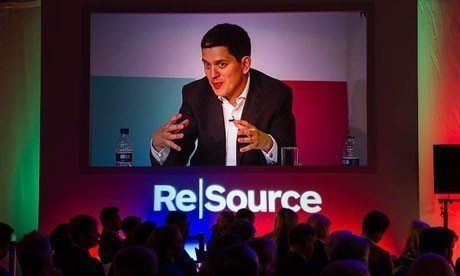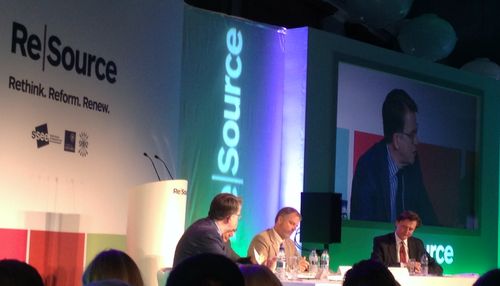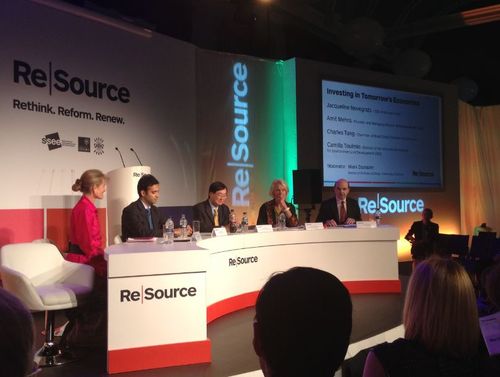
As recently mentioned, I attended the Re|source 2012 conference at Oxford University last week.
The meeting took place in the historic School of Examinations building ...

... and was a meeting of the great and the good to discuss how to build a sustainable world.
The conference had many of the leaders from politics and banking in attendance.
For example, several of the Rothschild financial family were there, as they had co-organised the event with Sir David King, the Chief Scientific Adviser to Tony Blair and Gordon Brown and Head of the Government Office for Science from 2000 to 2007.
I only managed to make it to the second day of the event, but the speaker list is very impressive including David Attenborough, Chris Patten, Jonathan Dimbleby, Peter Mandleson, Will Hutton, Jon Landau, Terry Leahy, Amartya Sen, David Miliband and more.
In fact, probably one of the most impressive line-up of speakers I’ve seen at a UK conference with, top of the list, Bill Clinton delivering the final keynote session.
Why so many of the world’s most elite and powerful?
Because the world has a finite amount of resources and at the current rate of population growth, urbanisation and general human consumption, all of it is going to run out soon:
- Over half of the world’s population lives in cities
- The global middle class will increase by 3 billion people by 2030
- A third of all food produced for human consumption is lost or wasted
- Companies that strategically cut their emissions are twice as profitable as those that do not
- There has been 147% rise in real commodity prices since 2000
- Resource efficiency savings could top a massive $3.5 trillion dollars in 2030
If you’re interested in more on this, then read the briefing papers prepared by Re|Source Academic Programme Directors Professor Sir David King,Professor Sir Chris Llewellyn Smith, Professor Charles Godfray and Professor Jim Hall (there’s plenty more where that came from by the way).

Photograph from the Guardian (see end of blog entry)
If you don’t want to read the papers, but just want a feel for how the day went, then read on as I managed to attend a few panel discussions, and so here’s my notes about them.
First, a dialogue about short-term versus long-term thinking with:
- Conor Kehoe, Director at McKinsey;
- Rowan Douglas, Chairman of the Willis Research Network;
- Will Hutton, Principal of Hertford College at the University of Oxford;
- Donald MacDonald, Trustee Director with the BT Pension Scheme; and
- Professor Lynn Stout, Distinguished Professor of Corporate and Business Law with Cornell University.
It was a great debate as it got into the real depths of why the Long Now is important. In other words, investing in long-term gains and projects at the expense of short-term gains and profits.
That’s fanciful, but something many have campaigned around including myself.
Just checkout the Long Blog about the Long Now if you really want to get into understanding this area well.
Anyways, Lynn summed it up well when she compared the idea of changing investors thinking from the short to the long being a challenge as everyone has gone short these days.
She noted that the average shareholding in 1960 was eight years but, today, it’s just four months.
The about-face that created such short-term investing was when it became cheap to trade. Before 1960 a financial transaction tax along with broker commission fees made it too costly to day-trade. Now those barriers have gone, and everyone wants to short.
We can reverse this through appropriate measures, such as reduced taxation on long-term dividend holdings and higher taxes on short-term gains but, as she put it, that is like ”fishing with dynamite”.
When everyone else is fishing with dynamite, you have to join in or you don’t get any fish. The same is true in stocks. If everyone else is shorting, you have to join in or you don’t get any returns.
This is not necessarily the case as, at the end of the panel, a great question was seeded from the audience: “why is that everyone venerates Warren Buffet but so few emulate him?”
It appears to be because Buffet does his research, gets a stock as a value investor, and holds it for the long-term knowing its value will increase.
Too few have such patience, knowledge, time or research.
Shame.
In summary, Lynn stated that: “we need to increase the costs of short term trading to increase long term holdings, and radically rethink senior executive pay to encourage breathing space for long term thinking.”
Agreed, but cannot see it happening whilst everyone is fishing with dynamite.
The next panel also proved illuminating as it discussed the costs of subsidies and whether they were being directed in the right or wrong way.
This panel comprised:
- Peter Mandelson, Chairman of the Global Counsel (aka the Prince of Darkness);
- Dr Lin Bogqiang, Director for China Centre for Energy Economic Research at Xiamen University;
- Dr Hisham Khatib, Energy and Development Expert, the World Energy Council; and
- Ronald Steenbilk, Senior Trade Policy Analyst with the OECD.

The panel talked about a whole range of issues with the way that subsidisation of economies works today, and gave out a whole range of interesting facts:
- $1.1 trillion is spent annually on resource subsidies
- The cost of subsidising fossil fuels was $400 billion in 2010 and will rise to $600 billion by 2020
- The ratio of subsidies spent on fossil fuels compared to renewables is 5:1
- Only 15% of total fossil fuel subsidies are directed to the poorest in society, which means most are going to the richest
It was all depressingly detailed stuff. For example, Dr Khatib is formerly the Chairman of the Jordan Electricity Regulatory Commission and stated categorically that 80% of the subsidies for fossil fuels in Jordan went to the richest 20% of the people.
The same appears to be true in Indonesia and most other markets, all in all facts that confirm this world is corrupt wherever and whatever way you look at it, so get on with working out how to direct investment to where it’s needed around such corruption.
After lunch we have a final session discussing tomorrow’s economies with:
- Jacqueline Novogratz, CEO of Acumen Fund
- Amit Mehra, Founder and Managing Director of Reuters Market Light
- Charles Tang, Chairman of the Brazil China Chamber of Commerce; and
- Camilla Toulmin, Director of the IIED.
This was probably the most compelling session as it was looking at what to do for tomorrow than for yesterday. It talked a lot about Africa, India, Pakistan, Brazil and China, and came up with another range of stats:
- Cows in Pakistan are a twelfth as productive as cows in Europe, which is why Pakistan is now importing EU bull embryos to create better cows
- India has over 600 million people involved in farming, with the average farm under two hectares, and yet whilst investment in agriculture in India has gone from $20m - $100m in the last 10 years, productivity has stayed the same
- Of the twenty fastest growing economies in 2011, EIGHT are African
- 40% of African land has no document to show ownership
Much of this I've known since hearing Bob Geldof talking about Africa as an investment opportunity back in 2007.
This discussion was fascinating as it talked about the fact that lots of the world is still to be developed but, in doing so, there has to be a balance between development and dignity.
There was a lengthy discussion here about taking away people’s lands and the issue of land rights. I had been involved in this myself some years ago – providing technology to the Queen’s Counsel who led the case for Aboriginal Land Rights in Australia in the 1980s – and know just how sensitive and important this subject has, is and always will be.
The debate was particularly interesting as Charles Tang was arguing for development fo lands whilst Camilla Toulmin was underlining that it had to be done with dignity.
When Charles responded: “of course, we recognise that a minimal level of human dignity needs to be retained as you develop lands and resources”, I wondered what that meant as China is regularly questioned about its views on human rights.

I’ve blogged in detail about such things in the past, so will avoid repeating them again here, but there is obviously a fine line between progress and destruction.
Anyways, I will write up the final two keynote speeches – Sir David King’s and Bill Clinton’s – over the next few days.
Meantime, if you want some other great facts, here are the two standouts of the whole year:
A diesel-powered aircraft carrier does 12 inches to the gallon; and
The aggregate weight of all the humans on Earth is less than the aggregate weight of all the ants on Earth!
Meantime, if you want some other perspectives on the event itself, here are three other useful links:
- The Guardian: Live blog from Oxford University - food, water and energy for all
- The Guardian: The financial community – emerging champions of resource management
- Climate Central: Global Fight For Natural Resources ‘Has Only Just Begun’
Chris M Skinner
Chris Skinner is best known as an independent commentator on the financial markets through his blog, TheFinanser.com, as author of the bestselling book Digital Bank, and Chair of the European networking forum the Financial Services Club. He has been voted one of the most influential people in banking by The Financial Brand (as well as one of the best blogs), a FinTech Titan (Next Bank), one of the Fintech Leaders you need to follow (City AM, Deluxe and Jax Finance), as well as one of the Top 40 most influential people in financial technology by the Wall Street Journal's Financial News. To learn more click here...






















